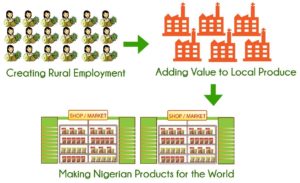If you’re looking for some great stories of innovation and successful start-ups, I would suggest looking for them in Africa. Recently, entrepreneurs in African nations have been realizing their potential at an astounding rate. A fantastic example of this is Affiong Williams and her company ReelFruit.
Williams, who was one of Forbes Africa’s 30 under 30 in 2015, founded her fruit processing company in Nigeria in 2012. The company sells dried fruit and nut snacks, but the impact is much larger. Williams has said that she founded the company because she saw a gap in the market and that “there is untapped opportunity in processing and value addition of raw materials.” She has also said, “I also believe it’s a very budding sector, there is a lot of opportunity as well as the job creation which I think is quite important to me as an entrepreneur to be able to play in an industry that would create a lot of jobs.”
Clearly, Williams is passionate about developing the agribusiness sector of the Nigerian economy as well as the the rural farmers themselves. This info-graphic can be found on their website:
The company’s current product line includes dried mango, pineapple, cashew, banana and coconut snacks. As an ambitious individual, Williams is working on raising capital to open a new, larger factory to produce and package more product as well as expand the product line.
Williams has said, “I hope to be on the cover of FORBES AFRICA in five years’ time.” This company is going places. Look for ReelFruit to expand and to have an incredible impact on the agribusiness economy of Nigeria and beyond.
 Curt Bowen grew up on a small organic farm in Idaho, so he knows a thing or two about agriculture and social engagement. His first service experience in Central America was building a house for a widowed family in Nicaragua as a teenager. During this trip he realized that it was impossible to help everyone in the same way, and that the root causes of poverty need to be examined rather than simply attempting to alleviate its symptoms.
Curt Bowen grew up on a small organic farm in Idaho, so he knows a thing or two about agriculture and social engagement. His first service experience in Central America was building a house for a widowed family in Nicaragua as a teenager. During this trip he realized that it was impossible to help everyone in the same way, and that the root causes of poverty need to be examined rather than simply attempting to alleviate its symptoms. example of the progress Semilla Nueva has made is pigeonpea. “Pigeonpea is a drought resistant bean bred to grow simultaneously with corn and other crops. It cuts fertilizer costs by fixing organic nitrogen, decreases soil compaction, provides high protein and nutrient rich food, and is open-pollinated, allowing farmers to save their own seed.” Simply giving farmers access to this seed can increase the health of the farmers’ soil, provide more nutritious food, and increase farmers’ incomes.
example of the progress Semilla Nueva has made is pigeonpea. “Pigeonpea is a drought resistant bean bred to grow simultaneously with corn and other crops. It cuts fertilizer costs by fixing organic nitrogen, decreases soil compaction, provides high protein and nutrient rich food, and is open-pollinated, allowing farmers to save their own seed.” Simply giving farmers access to this seed can increase the health of the farmers’ soil, provide more nutritious food, and increase farmers’ incomes. Although she didn’t attend Grove City College, Katie Davis is as much a Grover as any of us. She was her senior class president and homecoming queen; she had a fantastic group of friends and loving parents who supported her and wanted her to get a great education to prepare her for a successful career. Unlike most of us though, Katie did not attend college after she graduated high school. Instead, she moved to Uganda to teach kindergarten.
Although she didn’t attend Grove City College, Katie Davis is as much a Grover as any of us. She was her senior class president and homecoming queen; she had a fantastic group of friends and loving parents who supported her and wanted her to get a great education to prepare her for a successful career. Unlike most of us though, Katie did not attend college after she graduated high school. Instead, she moved to Uganda to teach kindergarten.
